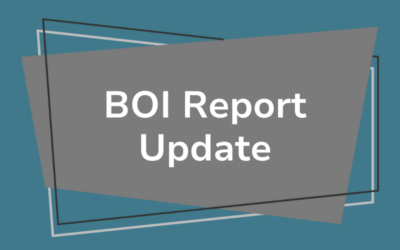The Corporate Transparency Act’s Beneficial Ownership Information Reporting Rule went into effect in January 2024, leaving many business owners wondering:
- Are they required to submit a Beneficial Ownership Information (BOI) Report?
- What’s the difference between beneficial owners and company applicants, and what information does a reporting company have to share about them?
Although certain entities are exempt, most small Corporations, Limited Liability Companies (LLCs), Limited Partnerships (LPs), Limited Liability Partnerships (LLPs), Limited Liability Limited Partnerships (LLLPs), and business trusts are required to report their beneficial ownership information to FinCEN, the bureau that receives BOI reports.
Key factors for determining if your company must report BOI:
- Did you file a document with your state’s secretary of state (or a similar office) to create your company? (If a foreign company, did you file a document to register it to do business in the United States?)
- Is your company exempt from the reporting rule? (Learn about the 23 BOI exemption categories.)
“Reporting company” is what FinCEN calls any company required to file a BOI report. In addition to providing various details about itself as an entity, it must also share information about its beneficial owners and possibly its company applicants.
Let CorpNet Handle Your BOI Filing
The Corporate Transparency Act and Beneficial Ownership Reporting rule are uncharted territory for businesses everywhere. But with CorpNet’s help in preparing and filing your BOI report, you’ll navigate the process with ease.
Who Is a Company Applicant?
A company applicant is an individual(s) who prepared or filed the business’s formation documents to legally create the entity.
A reporting company must identify one “direct filer” company applicant — the person who physically or electronically filed the entity registration documents. If another individual was responsible for directing or controlling the filing action, the reporting company should also identify that person in its BOI report.
Several things to keep in mind about company applicants:
- Company applicants must be individuals, not companies or legal entities.
- Every reporting company must identify a direct filer.
- If applicable, the reporting company should identify the individual involved in directing or controlling the filing of its formation documents.
- Company applicants might also be beneficial owners of the reporting company.
- Not all reporting companies must report their company applicant information:
- Domestic reporting companies created on or after January 1, 2024, and foreign reporting companies first registered to do business in the U.S. on or after January 1, 2024, must report company applicants
- Domestic reporting companies created before January 1, 2024, and foreign reporting companies first registered to do business in the U.S. before January 1, 2024, are not required to report company applicants.
- A reporting company does not have to issue an updated BOI report if, at any point after its initial report, the company applicant no longer has a relationship with the entity.
If required, a reporting company must provide the following information about its company applicants:
- Person’s legal name
- Date of birth
- Address
- An identification number from a driver’s license, passport, or other approved document, as well as an image of the Identifying document.
Who Is a Beneficial Owner of a Company?
A reporting company must report all of its beneficial owners on its BOI report. Beneficial owners are individuals with a controlling interest or other substantial control (direct or indirect) over the business entity.
Ownership interest criteria:
- If an individual owns or controls 25% or more of the reporting company’s ownership interests, they are a beneficial owner.
- Holding or controlling any of the following items is considered having an ownership interest:
- Equity
- Stock
- Capital or profit interest
- Voting rights
- Any instrument convertible into equity, stock, voting rights, or capital or profit interest
- Options or other non-binding privileges to buy or sell any of the interests mentioned above
- Any other instrument, contract, or mechanism used to establish ownership
It’s critical for business owners to identify the types of ownership interests in their company, identify the individuals who hold those interests, and calculate the ownership percentages held directly or indirectly by those individuals to determine who has ownership of at least 25% and must be reported as a beneficial owner.
When multiple individuals have ownership interests in a reporting company (either directly or through an entity that owns all or some of the reporting company), it can be challenging to calculate their ownership percentages to determine if they must be disclosed as beneficial owners. Speaking with an accountant or attorney for guidance can be helpful when the situation isn’t clear-cut.
Under certain circumstances, individuals who would otherwise be considered a beneficial owner do not have to be reported. The exceptions apply to the following types of individuals if they meet specific qualification requirements:
- A minor child
- An individual merely acting as the beneficial owner’s nominee, intermediary, custodian, or agent
- An employee of the reporting company who does not hold a senior officer position and whose control or economic benefit is derived solely from their stats as an employee
- An individual whose only interest in the reporting company is a future interest through a right of inheritance
- A creditor of the reporting company
Substantial control can be direct or indirect. When a person meets one or more of the criteria below, they are considered to have substantial control over a reporting company and are, therefore, a beneficial owner, regardless of whether they have an ownership interest:
- The individual holds the title or exercises the authority of a senior officer, such as President, Chief Financial Officer, Chief Executive Officer, Chief Operating Officer, General Counsel, or other position with comparable responsibilities.
- The individual makes or influences important decisions regarding the reporting company’s business finances, or structure.
- The individual is authorized to appoint or remove any senior officer or a majority of the reporting company’s governing body (e.g., board of directors).
- The individual exerts some other form of substantial control.
Examples of substantial control include:
- Serving as a member of the reporting company’s board of directors (However, not all directors might meet the substantial control criteria. Consider each board member individually to determine if they should be reported as a beneficial owner.)
- Owning or controlling a majority of voting power or voting rights.
- Controlling any intermediate entity that has substantial control over the reporting company.
A reporting company must provide the following information about its beneficial owners:
- Person’s legal name
- Date of birth
- Home Address
- An identification number from a driver’s license, passport, or other approved document, as well as an image of the Identifying document.
If any beneficial owner’s information changes (e.g., no longer has substantial control or 25% ownership interest or moved to a different address), the reporting company must issue an updated BOI report within 30 days of the change.
Have You Filed Your BOI Report Yet?
The consequences are significant for willfully failing to file initial beneficial ownership information on time, providing false information, or not updating inaccurate beneficial ownership information. They could include civil (up to $591 for each day the violation continues) or criminal penalties (including a fine of up to $10,000 and two years of imprisonment).
The current deadlines for filing:
- For the vast majority of reporting companies, the new deadline to file an initial, updated, and/ or corrected BOI report is now March 21, 2025. FinCEN will provide an update before then of any further modification of this deadline, recognizing that reporting companies may need additional time to comply with their BOI reporting obligations once this update is provided.
- Reporting companies that were previously given a reporting deadline later than the March 21, 2025 deadline must file their initial BOI report by that later deadline. For example, if a company’s reporting deadline is in April 2025 because it qualifies for certain disaster relief extensions, it should follow the April deadline, not the March deadline.
- As indicated in the alert titled “Notice Regarding National Small Business United v. Yellen, No. 5:22-cv-01448 (N.D. Ala.)”, Plaintiffs in National Small Business United v. Yellen, No. 5:22-cv01448 (N.D. Ala.)—namely, Isaac Winkles, reporting companies for which Isaac Winkles is the beneficial owner or applicant, the National Small Business Association, and members of the National Small Business Association (as of March 1, 2024)—are not currently required to report their beneficial ownership information to FinCEN at this time.
For more information, visit the BOI resources on the FinCEN website and download our BOI Reporting Fact Sheet.
More BOI Information and Resources
- The Purpose of BOI Reporting
- Consequences of Not Filing a BOI Report
- What Is a BOI Report and Do You Need to File One?
- BOI Reporting Requirements by Entity Type
- BOI Filing Requirements: What is Needed?
- Do Inactive Business Entities Need to File a BOI Report?
- Who Is a Beneficial Owner of a Business?
- Who Is Authorized to File a BOI Report?
- Is the Beneficial Owner Information Report a One-Time or Recurring Filing?
Let CorpNet Handle Your BOI Filing
The Corporate Transparency Act and Beneficial Ownership Reporting rule are uncharted territory for businesses everywhere. But with CorpNet’s help in preparing and filing your BOI report, you’ll navigate the process with ease.





